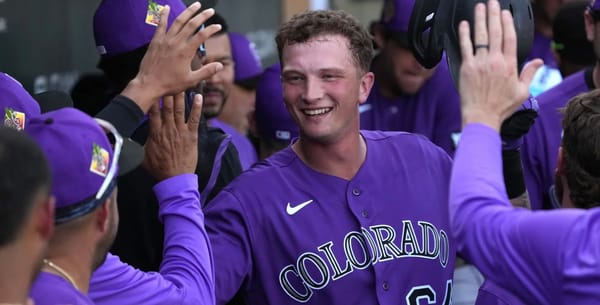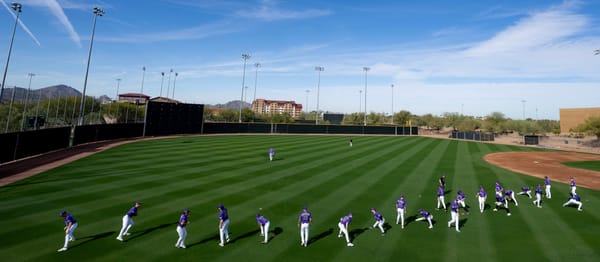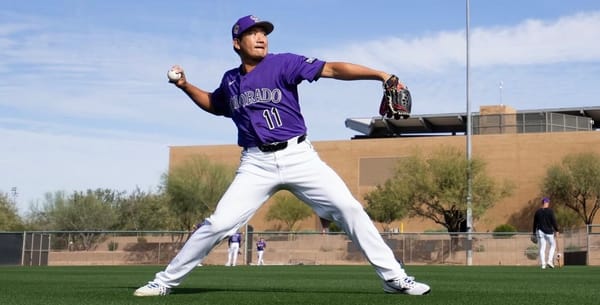Some thoughts on Paul DePodesta’s first week
And we’re off.
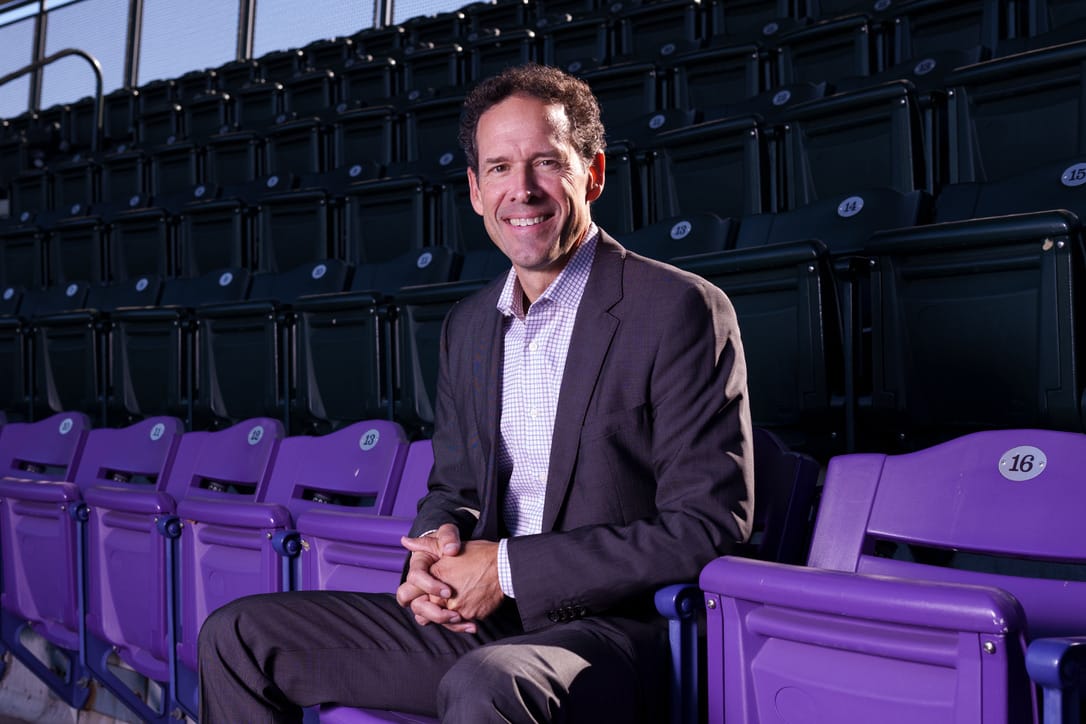
What a week it’s been for Colorado Rockies president of baseball operations Paul DePodesta. It was just a week ago that his hiring was announced. Since then, he’s attended the General Managers Meetings in Las Vegas and addressed media three times in addition to whatever work he’s doing as he quickly acclimates to his new team.
Watch a recording of his first Denver media availability here:
I suspect, right now, DePodesta is drinking from the proverbial fire hose.
Case in point? He’ll need to set the 40-man roster by Tuesday and make decisions about tendering contracts by November 21. And in the meantime, he’ll be building a staff, finding a general manager, working on hiring a coaching staff for the Rockies, and that’s all before he begins doing the front office work we’ll probably never hear about.
Last week, I was skeptical about the hire; this week, I find myself much more enthusiastic. So here are some initial impressions after the first week based on what we’ve learned so far.
He’s an excellent communicator — Perhaps after years of listening to Jeff Bridich and Bill Schmidt, I was just desperate to hear a Rockies executive who seemed to enjoy talking about baseball, but if that’s the case, DePodesta won me over.
During his time in Las Vegas, he did two media sessions, one for 30 minutes with Denver beat writers, and another for an hour with all baseball media. I’ve listened to audio of both, and he’s been knowledgeable, funny, and thoughtful.
Last week, I suggested that DePodesta might be reclusive given that he had not met with media since 2022. This week has dispelled those misgivings — and he told Patrick Saunders he intends to spend significant time in Denver. I’ve argued before that the Rockies need to improve their communication with fans, and it’s clearly a part of the job that DePodesta is ready for.
After all, in the near term, DePodesta will effectively be the face of the franchise, at least until the rebuild is further along. His early impressions suggest he’s up for that job.
He also appears committed to improving communication within the organization — A theme that emerged in reporting this week was the Rockies lack of effective internal communication. DePodesta has suggested he sees improving that part of the organization as key going forward.
That said, he’s careful not to alienate any current employees. For example, he speaks of seeing areas that work well, but they’re just not communicating with each other effectively. (This article from Thomas Harding lays out some of the communication and technology challenges the team faces.)
In making statements like these, he’s reassuring current employees that their jobs are safe and that he’ll be adding personnel and improving communication within the organization.
Part of this, I assume, is to placate Dick Monfort who is notoriously loyal. But it’s clear that DePodesta isn’t coming to 20th and Blake with a wrecking ball. Will there be change? Absolutely. But DePodesta has indicated it will be informed and gradual, which is also true of the future general manager.
“I’m not sure exactly how that’s going to evolve,” he said at Thursday’s press conference. “The reason I say that is because I’m a huge believer in building teams as opposed to just picking individuals. I want to find someone who can fill in some of my gaps, but also fill in some of the gaps in the rest of the organization as well.”
He has described himself as a “team builder,” and I expect him to be deliberate in how he does that.
The Rockies manager, I think, is a position he will fill quickly, and I’ve come to believe Warren Schaeffer will get that job. According to Patrick Saunders, DePodesta is looking for a manager who’s “able to relate to the players.” Schaeffer has shown he can do that. In addition, I think Schaeffer would be an excellent student in terms of working with the new front office.
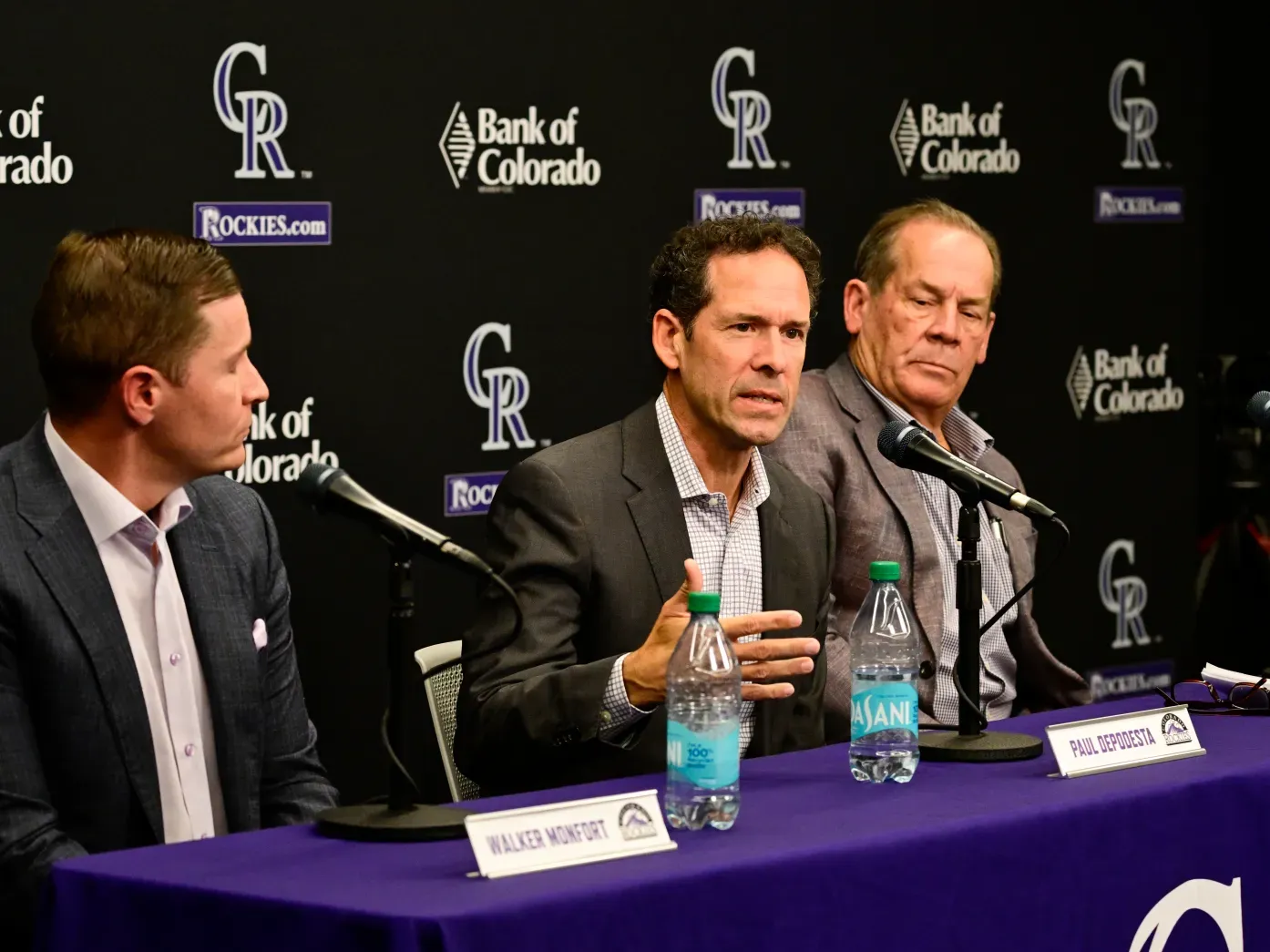
He appears to be building relationships with other teams — Because of his own professional history, DePodesta has a strong baseball background, even given his 10-year sabbatical from the sport. A notoriously weird Rockies organization desperately needs to improve its relationship with other teams, and all indications suggest DePodesta was working on that in Las Vegas as well.
Clearly, he’s not giving anything away in terms of his plans — he’s careful to say he’s got “ideas,” but he’ll keep them to himself. But he also understands the Rockies will need to make trades, and doing that will require some work on his part.
While in Las Vegas, DePodesta hinted that the Rockies probably have one area especially suited to trades. “I want to stop short of naming a particular position group,” he said. “I have one in mind for sure, but I do think there’s some depth there. And now I have to understand what the other 29 teams think, and what players they’re attracted to from our organization. But, again, I think we need to be open-minded about that.”
Surely, that position group is the Rockies’ surfeit of outfielders. My big question: Will Brenton Doyle still be with the Rockies when Spring Training starts?
He’s a big nerd (complimentary) — Obviously, DePodesta is no longer the “Google Boy” who worked with the Oakland Athletics. Rather, as he said, he’s learned a lot about people since then and that what worked in one place won’t necessarily work in another.
At the general manager meetings, Kevin Henry asked DePodesta about Michael Lewis’ Moneyball observation that he was “fascinated by irrationality.”
Here’s DePodesta’s answer:
I was an economics major. I actually did all the coursework to do a double major, also in psychology. And the reason for that was that I got to take an economics class my senior year in high school, and for the first time, academically, I thought, Wow, this is something that actually applies to the real world. This is how people make decisions. This is how the world works. So I thought, so I definitely want to major in this in college.
And then, after maybe the first or second semester of economics in college, I thought, Okay, I think I'm a pretty rational person, but I've never made decisions this way. And a lot of these theories are very elegant, but they don't necessarily describe exactly how individuals make decisions.
So that's when I started taking psychology, and then then just got really fascinated between the interplay of the two, of what's rational and what's not, and whether it's for an individual or for a group or for a society, etc.
So, I actually joked to Michael Lewis about this years later, but I said, at the time, in order to graduate with both degrees, I had to write a thesis that would incorporate both and satisfy both departments. And I did not have success convincing people in either department that sort of enough of their topic would be represented in the paper. So I decided not to write one.
And then, years later you could win a Nobel Prize in behavioral economics, you know, but back then, not, not so much so, but that's how I ran into it. So there was no intent behind it, but that's sort of how it happened.
(I assume DePodesta is referring to Daniel Kahneman’s Thinking Fast and Slow, which won the Nobel Prize for Economics in 2002.)
It’s a concept that continues to inform his decision-making: How do we ultimately make decisions? I share this lengthy passage in part because of the answer. He was, as an undergraduate, ahead of the time. But I also want to give you a sense of how he answers questions. He’s thoughtful and forth-coming.
I am a serious fan of a nerd — even more a self-referential one — and this is nerdiness in the best possible way. That said, DePodesta’s been clear that he likes a challenge — “I’m a sucker for an challenge,” he said in Las Vegas — and it’s going to take a serious nerd to solve the problem of baseball at elevation.
Dick Monfort is stepping back — There is, I know, skepticism about this, but I’ve decided to take Monfort at his word: He’s largely turning the Rockies over to his eldest son, Walker. I may be wrong about this, but recent events suggest that he is an extraordinarily wealthy man beginning the process of turning his estate over to his heirs, and he is trying to set them up for success.
Moreover, I believe he plans to focus on his work with MLB’s Labor Committee.
He said he will not be as involved on the baseball side, in part because he serves on the labor board for Major League Baseball’s owners. The current collective bargaining agreement is set to expire after the 2026 season, and speculation is already underway about potential labor strife, with the owners, led by Monfort, contemplating implementing a salary cap for the sport. The MLB Players Association is adamantly against a cap.
“I have a lot more responsibility with the league over the next year, so I have to allocate time there,” Dick, 71, said. “Plus, I’m getting older. Walker came to me and said he was interested in taking on (a bigger role). He can handle it.”
We also learned yesterday the new organizational structure: Monfort remains at the top with Walker as executive vice president and DePodesta reporting to him. Finally, the Rockies have created a front-office structure that creates some baffles between the team and the owner.
Closing thoughts
Maybe I’m just worn down by all that losing, but I have to say that I feel as optimistic as I have in some time about this baseball team. It feels like a new day.
This won’t be a typical offseason for Rockies fans who will be learning about this new team along with everyone else as DePodesta hires staff and makes moves and free-agent signings.
I don’t think the 2026 Rockies are going to be good, but I do think they’ll be better and very interesting.
Reader, I’m all in.
What I’m reading
There was a lot of great stuff written this week, so I want to share that here.
- Introducing Paul DePodesta, new Rockies president of baseball operations: ‘I’m a bit of a sucker for a challenge’ | Denver Gazette — Kevin Henry reports on DePodesta’s first meeting with Rockies beat writers.
- The Colorado Rockies cannot, and must not, be normal | The Ringer — “I feel bad for their fans, but the Rockies are tremendous content,” writes Ben Lindbergh.
- Paul DePodesta not afraid to take swings in order to turn around floundering Rockies | Associated Press — Here’s a summary of yesterday’s presser.
- Rockies’ Paul DePodesta says Coors Field could be the best home-field advantage in baseball | 104.3 The Fan — Trent Finnegan explores DePodesta‘s remarks on weaponizing Coors Field.
- Dick Monfort hired Paul DePodesta as baseball nanny for his sons | Denver Gazette — If you’ve got a parade you’d like rained on, Mark Kiszla is your person.
Closing thoughts
As I’m re-reading this, Thomas Harding just posted the following:
Changes in #Rockies player development: They have parted ways with pitching strategist Flint Wallace, Minor League pitching coordinator Doug Linton and Triple-A @ABQTopes pitching coach Chris Michalak, plus High-A @spokaneindians hitting coach Trevor Burmeister.
— Thomas Harding (@hardingmlb.bsky.social) 2025-11-14T16:28:50.756Z
It’s happening.
As always, thanks for reading —
Renee
Rockies Pitch is a newsletter that focuses on Colorado Rockies baseball.
Find me on Bluesky at @ReneeDechert.com or send an email to Renee@RockiesPitch.com.


